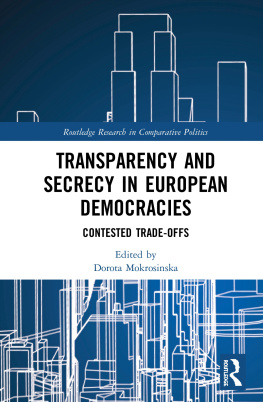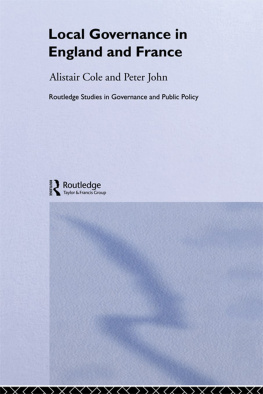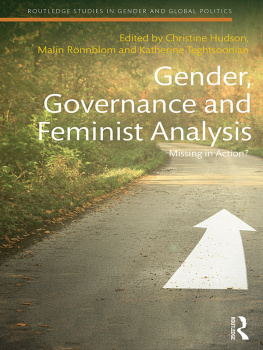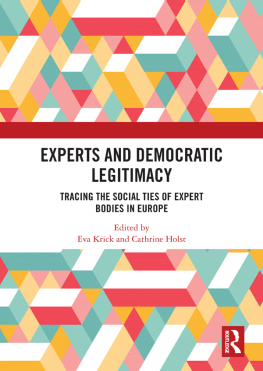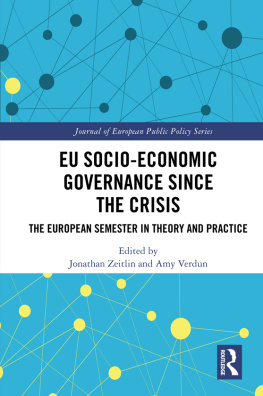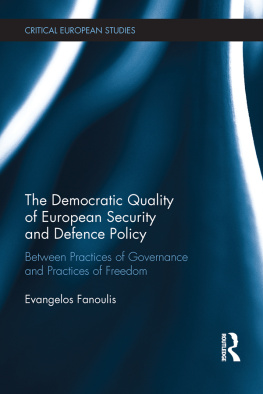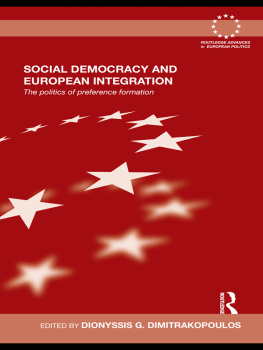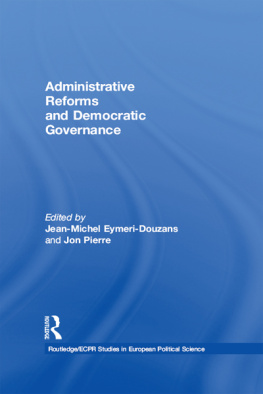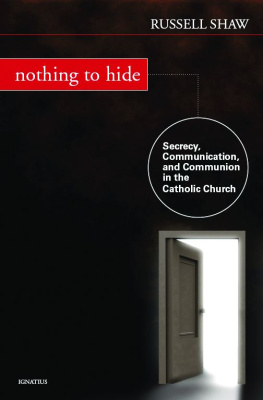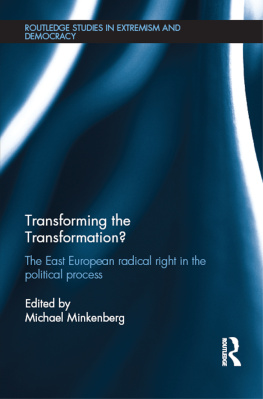Transparency and Secrecy in European Democracies
This edited volume offers a critical discussion of the trade-offs between transparency and secrecy in the actual political practice of democratic states in Europe. As such, it answers to a growing need to systematically analyse the problem of secrecy in governance in this political and geographical context.
Focusing on topical cases and controversies in particular areas, the contributors reflect on the justification and limits of the use of secrecy in democratic governance, register the social, cultural, and historical factors that inform this process and explore the criteria used by European legislators and policymakers, both at the national and supranational level, when balancing interests on the sides of transparency and secrecy, respectively.
This book will be of key interest to scholars and students of security studies, political science, European politics/studies, law, history, political philosophy, public administration, intelligence studies, media and communication studies, and information technology sciences.
Dorota Mokrosinska is Associate Professor of Political Philosophy and the Programme Director of the Centre for Political Philosophy at Leiden University, The Netherlands.
Routledge Research in Comparative Politics
Think Tanks in the US and EU
The Role of Policy Institutes in Washington and Brussels
Christopher J. Rastrick
Institutions, Partisanship and Credibility in Global Financial Markets
Hye Jee Cho
Health and Political Engagement
Mikko Mattila, Lauri Rapeli, Hanna Wass and Peter Sderlund
Theorizing Cultures of Political Violence in Times of Austerity
Studying Social Movements in Comparative Perspective
Joanna Rak
Interest Group Organisation in the European Union
How Internal Organisational Structures Shape Interest Group Agency
Michelle Hollman
Coalition Government as a Reflection of a Nations Politics and Society
A Comparative Study of Parliamentary Parties and Cabinets in 12 Countries
Edited by Matt Evans
Transparency and Secrecy in European Democracies
Contested Trade-offs
Edited by Dorota Mokrosinska
For more information about this series, please visit: https://www.routledge.com
First published 2021
by Routledge
2 Park Square, Milton Park, Abingdon, Oxon, OX14 4RN
and by Routledge
52 Vanderbilt Avenue, New York, NY 10017
Routledge is an imprint of the Taylor & Francis Group, an informa business
2021 selection and editorial matter, Dorota Mokrosinska; individual chapters, the contributors
The right of Dorota Mokrosinska to be identified as the author of the editorial material, and of the authors for their individual chapters, has been asserted in accordance with sections 77 and 78 of the Copyright, Designs and Patents Act 1988.
All rights reserved. No part of this book may be reprinted or reproduced or utilised in any form or by any electronic, mechanical, or other means, now known or hereafter invented, including photocopying and recording, or in any information storage or retrieval system, without permission in writing from the publishers.
Trademark notice: Product or corporate names may be trademarks or registered trademarks, and are used only for identification and explanation without intent to infringe.
British Library Cataloguing-in-Publication Data
A catalogue record for this book is available from the British Library
Library of Congress Cataloging-in-Publication Data
Names: Mokrosinska, Dorota, editor.
Title: Transparency and secrecy in European democracies : contested trade-offs / edited by Dorota Mokrosinska.
Description: Abingdon, Oxon ; New York, NY : Routledge, 2021. |
Includes bibliographical references and index.
Identifiers: LCCN 2020024714 (print) | LCCN 2020024715 (ebook) |
ISBN 9780367133405 (hardback) | ISBN 9780429026003 (ebook)
Subjects: LCSH: Transparency in governmentEurope. | Official secretsEurope. | Freedom of informationEurope. | Government accountabilityEurope. | DemocracyEurope. | EuropePolitics and government21st century.
Classification: LCC JN13 .T74 2021 (print) | LCC JN13 (ebook) |
DDC 323.44/83094dc23
LC record available at https://lccn.loc.gov/2020024714
LC ebook record available at https://lccn.loc.gov/2020024715
ISBN: 978-0-367-13340-5 (hbk)
ISBN: 978-0-429-02600-3 (ebk)
Typeset in Times New Roman
by codeMantra
Introduction
Transparency and secrecy in European democracies
Dorota Mokrosinska
Transparency in politics is the mantra of modern democratic governance. Yet while officials preach the value of open government, hardly a day goes by without the media reporting a scandal involving secrecy: the Washington Post exposing the CIAs secret detention facilities in Central and Eastern Europe; the New York Times revealing transatlantic collaboration over the Terrorist Finance Tracking Programme (TFTP); regular leaks in the media related to trade negotiations between the EU and its strategic partners, especially in the context of the Comprehensive Economic Trade Agreement (CETA) with Canada and the Transatlantic Trade and Investment Partnership (TTIP) with the US; WikiLeaks and Cablegate; The Guardian publishing Edward Snowdens revelations about PRISM. As such disclosures make clear, institutional opacity and the culture of secrecy are deeply entrenched in the political institutions of democratic states (Thompson 1999; Roberts 2006; Curtin 2011; Sagar 2013). Despite an increase over the last three decades in legislative instruments and initiatives aimed at enhancing legal and political transparency in governance, the realm of state secrecy persists in the form of classified intelligence programmes, espionage, secret military operations, diplomatic discretion, closed-door political bargaining, and bureaucratic opacity.
In the light of the democratic benefits believed to result from transparency, the persistence of secrecy appears troubling. Understood as the absence of constraints regarding citizens access to information, transparency in politics has become a symbol of good governance. Transparency, as Mark Fenster puts it, appears to provide such a remarkable array of benefits that no right-thinking politician, administrator, policy wonk, or academic could be against it (Fenster 2006, pp. 888889). Described as a Swiss army knife of policy tools (Haufler 2010, p. 56), or as societys multivitamin (Scholtes 2012, p. 2), it has acquired a quasi-religious significance (Hood 2006, p. 3). Transparency is cherished as the condition of democratic legitimacy, a synonym for clarity, coherence, and sincerity in the handling of public affairs. It ensures that citizens have the information they need to participate as equals in collective decision-making and it guarantees citizens control over office-holders and institutions. From this perspective, secrecy, which is the intentional withholding of information by governments, seems to exclude citizens from political participation, inhibit mechanisms of democratic accountability, and facilitate corruption and abuses of power.
The presumption in favour of transparency and against secrecy has for a long time determined democratic scholarship. Recent scholarship, however, has qualified the unconditional character of this position by pointing to the drawbacks of transparency and the advantages of secrecy. A number of policy-oriented studies indicate the dangers of diminishing returns on transparency by demonstrating that transparency-overload discourages innovative behaviour, and triggers defensive information management, proceduralism, and rule-obsession. Scholars point out that rigorous transparency policies, by allowing for constant observation and surveillance, accounting, auditing, and oversight, lead to decision-making that is governed more by fear and avoidance of the appearance of wrongdoing than appropriate risk taking in response to social and political challenges. As administrators are being scrutinised more frequently and thoroughly, they get better at meeting the requirements posed by their accountability forums, while not necessarily performing better in terms of effective policy-making (Anechiarico and Jacobs 1996; Bovens 2010, p. 958). Other cited drawbacks of transparency include harm to a states interests when sensitive, for example, military or intelligence, information is at stake, and international tensions over revelations of diplomatic confidences. Such arguments resonate in public debate. Even though the importance of transparency appears to be undisputed, many feel that complete transparency would undermine the efficiency of governance. Take public responses to the WikiLeaks disclosures: many of the disclosures were assessed favourably, but few people defended the idea of the total transparency which inspired them. Regardless of the desirability of full transparency, a concern has been voiced about its feasibility: the sheer organisational complexity of the state and the fact that its administrative apparatus is dispersed over a large number of agencies with a significant decision-making autonomy and spread over large geographical territories makes it impossible to develop and implement the technocratic tools that would make the state fully open (Fenster 2010).

